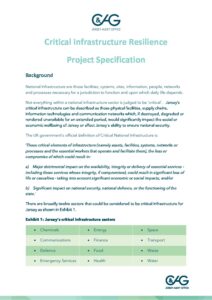
Tuesday 7 November 2023 - Project Specification
Tuesday 7 November 2023 - Project Specification
Topics: Risk Management
Departments: All
Sector: All

Project Specification: pdf (222.94 KB)
Download in full ↓National Infrastructure are those facilities, systems, sites, information, people, networks and processes necessary for a jurisdiction to function and upon which daily life depends.
Not everything within a national infrastructure sector is judged to be ‘critical’. Jersey’s critical infrastructure can be described as those physical facilities, supply chains, information technologies and communication networks which, if destroyed, degraded or rendered unavailable for an extended period, would significantly impact the social or economic wellbeing of Jersey or affect Jersey’s ability to ensure national security.
The UK government’s official definition of Critical National Infrastructure is:
‘Those critical elements of infrastructure (namely assets, facilities, systems, networks or processes and the essential workers that operate and facilitate them), the loss or compromise of which could result in:
a) Major detrimental impact on the availability, integrity or delivery of essential services – including those services whose integrity, if compromised, could result in significant loss of life or casualties – taking into account significant economic or social impacts; and/or
b) Significant impact on national security, national defence, or the functioning of the state.’
There are broadly twelve sectors that could be considered to be critical infrastructure for Jersey.
Critical infrastructure systems within these sectors are particularly vulnerable to being damaged or disrupted. This is because they are often organised in complex networks through which even small local shocks can propagate quickly[1]. A disruption to any of the critical infrastructure systems can have serious implications for business, government and the community. Chronic infrastructure challenges such as ageing and/or poor maintenance increase the risks of inadequate service provisions and can worsen the impact of issues and threats when they arise.
Ensuring the security and resilience of Jersey’s critical infrastructure is a responsibility shared by the States, infrastructure owners and operators. Each have different responsibilities for critical infrastructure depending on the system and/or the nature of the threats to be mitigated. Responses to a threat can involve the asset owner and operator, the technical and operational lead for Government and emergency services or law enforcement. Co-ordination among entities is therefore required to prepare, rehearse and respond to critical infrastructure threats.
Significant public funds can be spent responding to emergencies relating to critical infrastructure. It is important for Jersey to have in place an effective resilience framework supported by effective resilience plans and procedures across the States, asset owners and operators.
Jersey is planning to introduce a new Civil Contingencies Law with a focus on resilience. The Jersey Resilience Forum (JRF) is a multi-agency organisation that brings together those who have a role to play in an emergency response from within and outside the Government. The JRF, through its Delivery Group, is seeking to work across its membership to ensure that appropriate plans are in place in each organisation in the event of an incident, and that these are shared with Government.
This review will evaluate whether the Government has an effective approach to critical infrastructure resilience that encompasses supporting and requiring asset owners and operators to implement high standards of resilience.
The review will consider whether:
· effective governance arrangements are in place to administer critical infrastructure protection policies (policies aimed at reducing the vulnerabilities of and increasing the resilience of critical infrastructure); and
· effective resilience plans and compliance activities are in place across Government, asset owners and operators and are consistent with critical infrastructure protection objectives.
This review will consider, in a phased approach, the following critical infrastructure sectors within Jersey:
· energy
· transport
· waste; and
· water.
The first phase of the review will focus on the energy sector and will include electricity, gas and all petroleum products and will include the supply chains servicing the energy sector.
The scope of future phases of the review will similarly focus on provision of services and the supply chains supporting the provision of services.

Associate Member of EURORAI - a cooperation project between public sector supervisory bodies in Europe